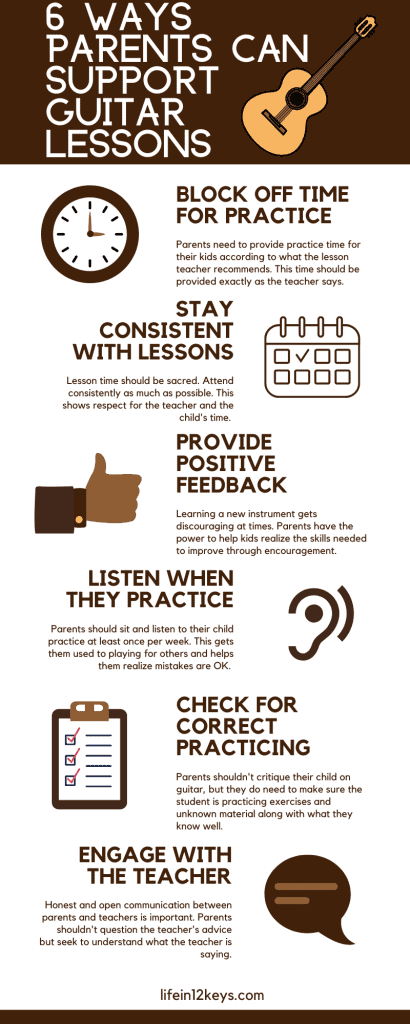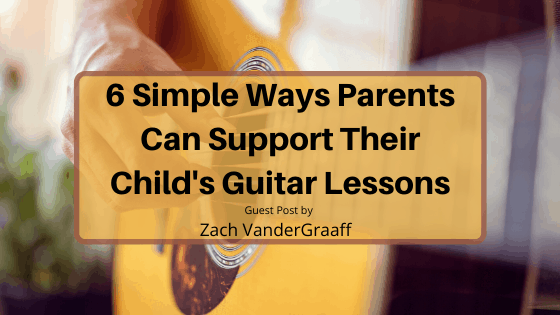As a music teacher and private lesson instructor for a while now, I’ve taught them all. From ages 7-70, I’ve seen students become proficient on guitar no matter what their background.
The challenges from younger learners are much different than with older ones. The sad thing is the reason most of the younger students (18 and under) quit is because of the parents.
Without realizing it, parents may be hamstringing their child’s learning potential.
With this in mind, over the years I’ve developed this list of 6 simple ways parents can support their child’s guitar lessons.
Doing these things won’t guarantee a child will stick with it, but at least you’ll know you gave them everything you could.

Blocking Off Time For Practicing
All guitar players and any musician knows that talent is but a small piece of a puzzle. The key to real improvement is consistent practice.
Kids actually enjoy practicing in my experience. Even if it’s only for shorter 15 minute periods (which is totally fine in my opinion), kids seek out the chance to improve. Parents have a responsibility to block off time specifically for practicing.
We all have busy lives and things going on, but whenever possible, parents must protect practice time. For one, it models for the kid (at any age) how important practice is. Additionally, it shows the child how much the parent values the effort the kid is going through.
Even surly teenagers will notice and feel this, though they may not say it.
Staying Consistent With The Lesson Schedule
Along the same lines, parents need to make sure the student is getting to their lessons consistently. This is a must for the student’s development.
Taking lessons (or at least jumping on a dedicated learning program) consistently helps the kid by making sure they get feedback on their playing and posture.
Teachers and programs will make sure the student is developing equally in the different areas of guitar playing. They’ll also be able to point out where mistakes are being made. Follow the teacher or program’s recommendations for how often the student needs to attend, and attend consistently.
It’s not OK to miss a lesson here or there. Sometimes situations are unavoidable, and the student has to miss. This should be the exception, not the rule.

Provide Positive Feedback
It may seem obvious, but parents need to encourage their children when they practice guitar. Learning a new instrument is a tough process, and it gets frustrating at times, especially in the beginning.
Parents, even musical ones like me, don’t need to “fix” their kid’s problems or offer them “help.” This is for the teacher, program, and student to figure out. All parents should do is be there to encourage their child through successes and struggles.
Even if something isn’t going well, a parent can still find something to compliment. Keep the encouragement sincere, though, or the student will see right through it. I teach parents that an effective piece of encouragement contains two parts: naming the behavior and labeling it.
Examples include:
- You were in your room practicing? That’s discipline; nice work!
- Those fingerpicking patterns are coming along. Your focus is paying off!
- You walked away when you got frustrated and then went back later. This takes a lot of self-awareness even most adults don’t have.
- You’re noticing something is wrong with how you’re playing right now. It’s frustrating to mess up, but it’s more important that you’re paying attention and problem solving. I’m proud of you.
Listen When The Child Practices
Believe me, I know as a music teacher how painful it sounds when someone picks up a new instrument. I teach recorders in my elementary classes after all!
Practicing is an isolating thing at times. Parents still need to sit in on some of their child’s practice sessions. It’s not a judgement thing; they just need to show their kids they care and are invested in their lessons.
At first, it may seem weird, especially if you haven’t been doing this before. The student may be self-conscious. In time, they get used to performing for people and learn not to be ashamed of the mistakes they make of the learning process.
I tell the parents of my students to just sit nearby and listen. It’s best if parents show they’re listening attentively, but the student is uncomfortable, they can bring a book and read while the student practices. This doesn’t have to be every practice session, but it should at least happen once per week.

Checking For Correct Practicing
It’s fun to practice the things you’re good at. It makes everyone feel good when they can play something well. It doesn’t help you improve as much as possible though.
Practicing needs to include a good balance or technical exercises, known material, and unknown material. This is part of why I was drawn to Craig’s site here. I love how his materials do just this and encourage well-rounded musicianship for guitarists.
Students (adults and kids) tend to fall into the trap of practicing only what they know. Parents need to help the student’s learning by checking to make sure the kids are practicing all they need to.
Engaging With The Lesson Teacher
If using a lesson teacher, the parent needs to open communication with them. Listen to what the teacher says and recommends; they’re the expert in this situation.
As a parent, I feel the need to defend my child, and I understand the instinct to question anyone who thinks they know what’s best for my kid. In this area, the teacher IS the expert. They know more than us parents. It’s a bitter pill to swallow, but it’s true.
I don’t question my doctor when they say my child needs antibiotics for an infection, but I will ask for more information, so I can better understand the situation. It’s the same with guitar playing. Parents should ask for clarification and communicate with the lesson teacher, but they need to be on the same side.
Otherwise, the student may begin to distrust the teacher, parent, or both. This causes frustration and potential quitting.
Final Thoughts
Learning any instrument is a great thing for any kid to do, but learning the guitar is one of my personal favorites. It’s easy to pick up once you’ve got it, and with limited skills, you’re still able to lead groups in almost any song.
As a parent, I know how important the little things are. By keeping these 6 simple ways in mind and sharing them with parents, we can make a difference and give young students a better chance for success in their guitar lessons.

Zach VanderGraaff is a K-5 music teacher at Bay City Public Schools and founder of Dynamic Music Room. He also serves as Past-President of Michigan Kodaly Educators and current Executive Secretary of the Midwest Kodaly Music Educators Association.

Craig Smith is a professional Guitarist, Teacher, and Writer living in Sanford, Florida. Craig has taught guitar lessons, performed 200+ gigs per year for nearly 30 years, and published 4 guitar instructional books. When he’s not gigging or writing, you may find him by the pool with his wife Celeste, 4 Chihuahuas, and a drink. 🎸

